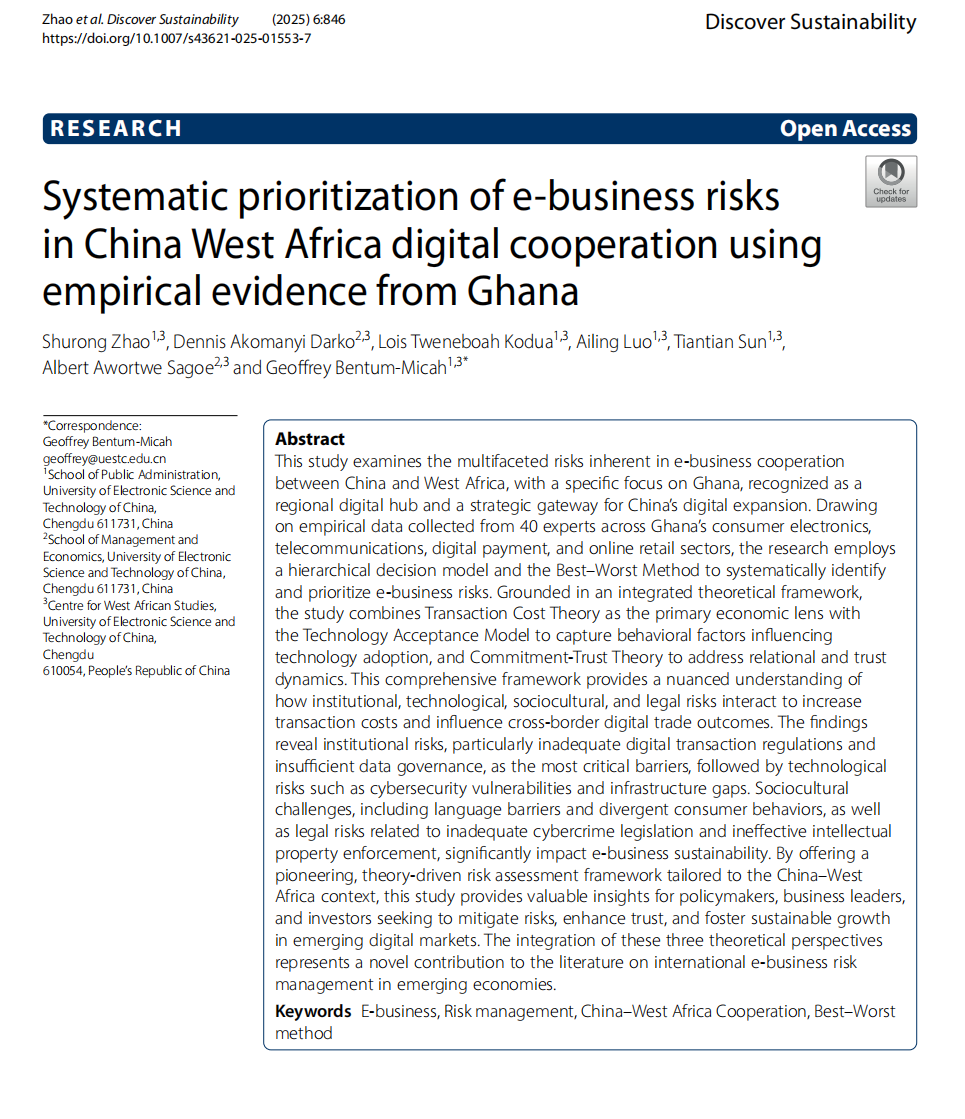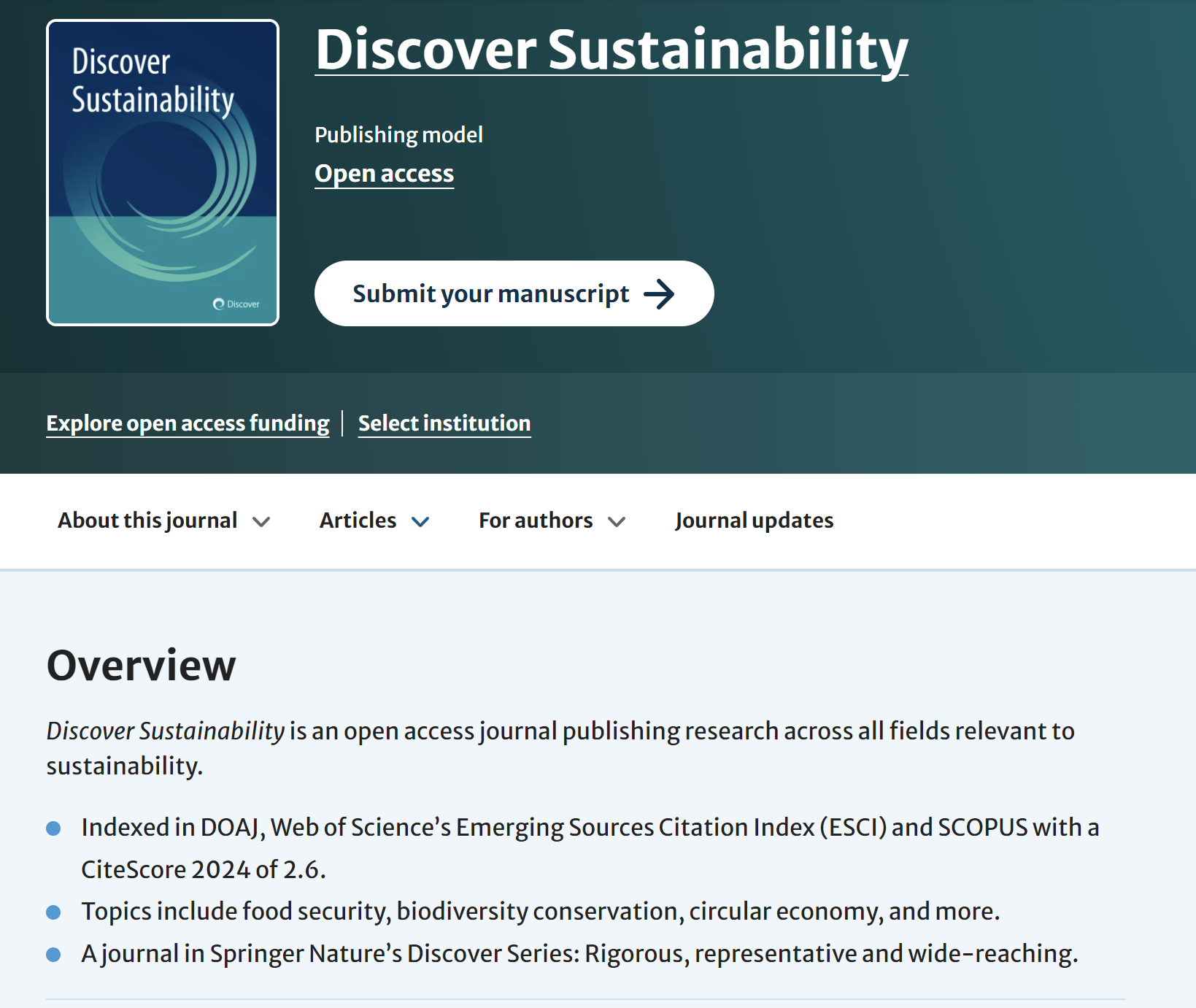IF:3.0 (2024)
See the link for the full text:https://link.springer.com/article/10.1007/s43621-025-01553-7

This paper was completed by the research team including Dennis Akomanyi Darko, Lois Tweneboah Kodua, Geoffrey Bentum-Micah and others under the guidance of Professor Zhao Shurong. It has been included in the journal Discover Sustainability. (ISSN: 2662-9984).
Title:Systematic prioritization of e-business risks in China West Africa digital cooperation using empirical evidence from Ghana
一、摘要
本研究以加纳为案例,通过40位来自消费电子、电信、数字支付和在线零售领域的专家数据,采用层次决策模型与BWM方法,系统识别并优先排序中非电子商务合作中的风险。研究结合交易成本理论、技术接受模型和承诺-信任理论,构建综合理论框架,揭示制度、技术、社会文化和法律风险如何增加交易成本并影响跨境数字贸易结果。制度风险最为关键,尤其是数字交易法规不完善和数据治理不足,其次是技术风险(如网络安全漏洞和基础设施差距)。社会文化和法律风险也对电子商务可持续性产生重要影响。
二、引言
电子商务的快速发展为国际贸易带来新机遇与挑战,尤其是在中国与西非(如加纳)之间的合作中。尽管非洲大陆自由贸易区(AfCFTA)和“一带一路”倡议(BRI)为合作提供框架,但仍面临技术、监管、法律和社会文化等多方面风险。现有研究缺乏针对中非电子商务合作的系统化风险管理框架,本研究通过整合多种理论视角,填补这一空白。
三、文献综述
中国与西非电子商务合作涵盖技术转移、能力建设和基础设施发展,战略上依托于BRI和中非合作论坛(FOCAC)。加纳作为西非数字枢纽,具有战略地位和年轻人口优势,AfCFTA也进一步推动区域一体化。然而,监管缺口、网络安全威胁和数字鸿沟等问题仍存,需合作治理框架以有效管理风险。
四、理论框架
研究整合三种理论:交易成本理论(TCT)作为核心经济框架,解释制度与法律风险如何增加交易成本;技术接受模型(TAM)从行为角度分析技术风险对采纳的影响;承诺-信任理论强调信任在减少法律与社会文化风险中的作用。三者结合提供全面分析框架。
五、研究方法
研究采用目的性抽样,选取40位加纳电子商务领域的专家代表,涵盖四大行业。样本分布合理,确保数据代表性和专业性。
六、数据的收集与分析
数据通过结构化在线问卷收集,使用Qualtrics平台,涵盖人口统计、风险评估和BWM偏好 elicitation。共发出55份邀请,回收43份,最终有效样本40份,响应率78.2%,符合BWM方法要求。
问卷包括三部分:人口信息、风险评估(制度、技术、社会文化、法律四大风险域,采用9点Likert量表)和BWM偏好 elicitation 部分,用于计算各风险权重。
七、研究结论与讨论
BWM分析显示,制度风险权重最高(0.363),其次是技术风险(0.286)、社会文化风险(0.177)和法律风险(0.174)。子风险中,“数字交易法规缺失”和“数据治理不足”最具优先级。一致性指标良好,表明专家判断可靠。
制度风险主导源于加纳数字转型速度快于政策发展;技术风险受限于网络安全与IT人才短缺;社会文化风险涉及语言、支付习惯与文化适配;法律风险主要体现在知识产权与网络犯罪立法不足。研究结果与既有文献一致,但通过BWM和子风险分析提供了更细粒度的见解。
八、管理启示
制度风险是中非电子商务合作最主要障碍,尤其是数字交易法规与数据治理问题。技术、社会文化和法律风险也需针对性应对。研究通过整合TCT、TAM和承诺-信任理论,提供了一套理论驱动、实证支持的风险管理框架,为政策制定者、企业管理者和投资者提供实践指导。

英文摘要:
This study examines the multifaceted risks inherent in e-business cooperation between China and West Africa, with a specific focus on Ghana, recognized as a regional digital hub and a strategic gateway for China’s digital expansion. Drawing on empirical data collected from 40 experts across Ghana’s consumer electronics, telecommunications, digital payment, and online retail sectors, the research employs a hierarchical decision model and the Best–Worst Method to systematically identify and prioritize e-business risks. Grounded in an integrated theoretical framework, the study combines Transaction Cost Theory as the primary economic lens with the Technology Acceptance Model to capture behavioral factors influencing technology adoption, and Commitment-Trust Theory to address relational and trust dynamics. This comprehensive framework provides a nuanced understanding of how institutional, technological, sociocultural, and legal risks interact to increase transaction costs and influence cross-border digital trade outcomes. The findings reveal institutional risks, particularly inadequate digital transaction regulations and insufficient data governance, as the most critical barriers, followed by technological risks such as cybersecurity vulnerabilities and infrastructure gaps. Sociocultural challenges, including language barriers and divergent consumer behaviors, as well as legal risks related to inadequate cybercrime legislation and ineffective intellectual property enforcement, significantly impact e-business sustainability. By offering a pioneering, theory-driven risk assessment framework tailored to the China–West Africa context, this study provides valuable insights for policymakers, business leaders, and investors seeking to mitigate risks, enhance trust, and foster sustainable growth in emerging digital markets. The integration of these three theoretical perspectives represents a novel contribution to the literature on international e-business risk management in emerging economies.
Keywords: E-business, Risk management, China–West Africa Cooperation, Best–Worst method
本文由西非研究中心团队成员在赵蜀蓉教授的指导下完成,已收录于期刊 Discover Sustainability. (ISSN: 2662-9984)。
本研究为四川省哲学社会科学规划重点项目(SCJJ23ND61)和教育部高校国别和区域研究课题(2024-N01)阶段性成果。
文字:罗爱玲
图片:罗爱玲
责编:杨永星
审稿:西非研究中心负责人